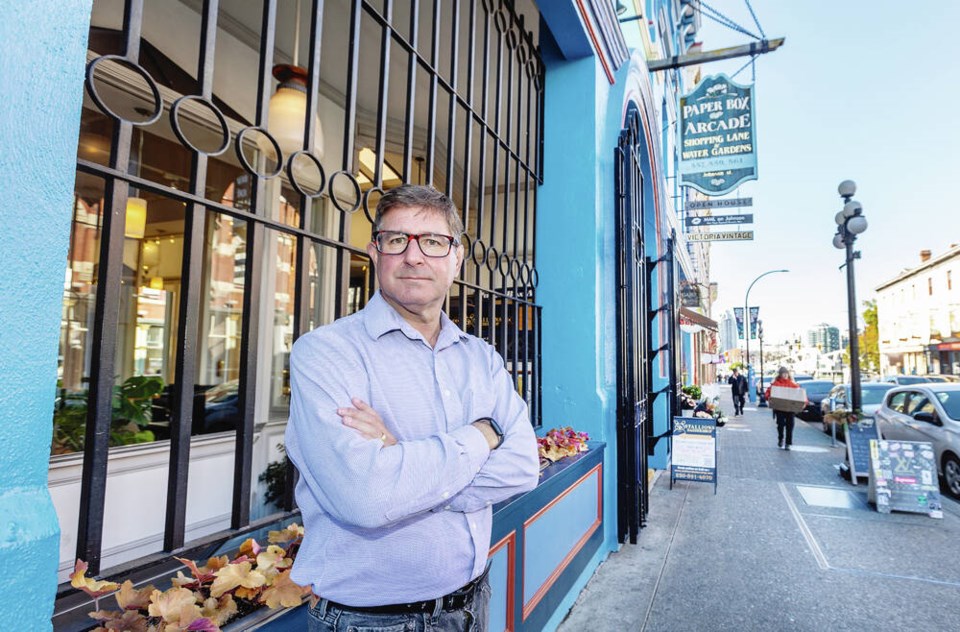Thirty-plus B.C. retailers, trade organizations and community associations — including representatives from Victoria and Nanaimo — are calling for a unified effort to tackle “epidemic” levels of theft, violence and vandalism.
The Save Our Streets (SOS) coalition, unveiled in Vancouver on Monday, is urging all levels of government to develop plans with measurable outcomes to tackle disorder.
Many initiatives take on one issue at a time rather than looking at wider solutions, said the group, whose members include the Downtown Victoria Business Association, the Nanaimo and Area Public Safety Association, London Drugs, Save-on-Foods and the B.C. Restaurant and Food Services Association.
“All levels of government, regardless of their political stripe, just have to act differently and they have to act with urgency,” said London Drugs president Clint Mahlman, founding chair of the group. He said escalating levels of violence, vandalism and theft have reached a crisis point.
“Governments and justice administration officials need to step up and do their jobs to make our streets safer.”
Mahlman said his stores’ loss-prevention officers have faced knives, box cutters, needles, hatchets and chains, as well as people biting, spitting and throwing punches.
Security staff at the stores are now pilot-testing professional-grade stab-protection vests that cost $1,700 each. “That’s the extremes we are having to take to protect our staff.”
This past weekend, a London Drugs staffer in Prince George was sent to hospital after being attacked. A chronic offender returned to a Mission outlet with a large knife after being asked to leave, Mahlman said. The man was arrested by RCMP, who were waiting for him.
He said London Drugs has spent millions of dollars in the past couple of years ensuring its stores are safe for customers and staff. As well as training staff in non-confrontational de-escalation skills, the company relies on technology, he said.
For example, it will use a high-definition camera to monitor someone committing a crime, then turn the file over to police, who can then arrest the individual outside the store.
Jeff Bray, chief executive of the Downtown Victoria Business Association, said the SOS group’s retail members have seen a “significant spike” in losses through shoplifting and smash-and-grabs. “We really need to raise the profile of this problem because it is costing huge amounts of money when this stuff walks out the door. And there seems to be no repercussions for perpetrators.”
This month, Victoria police arrested 20 people and recovered $25,000 worth of stolen merchandise in a three-day blitz at a store in the 500 block of Johnson Street. One person who was arrested and released returned two days later to steal more goods. That person was arrested again and this time kept in custody.
Last week, Vancouver police reported that there had been 258 arrests in a campaign against violent and chronic offenders that saw close to $57,000 worth of merchandise recovered.
Bray said the prime concern is the safety of staff and customers. He is among those calling for changes at the federal level to make it more difficult to release chronic offenders on bail.
For those whose criminal activity is driven by mental-health problems and addictions, “we need to have much stronger services, including involuntary care for people who are really, really struggling,” Bray said.
In Nanaimo, frustration with street disorder has led to ongoing public rallies to call for change.
Karen Kuwica of the Nanaimo and Area Public Safety Association said the city is in the midst of an “extreme social crisis,” the result of the convergence of the opioid crisis, shortage of affordable housing and a mental-health and addictions crisis.
Another member of the group, Kevan Shaw, said the situation is “past the tipping point.”
“Enough was enough a long time ago.”
>>> To comment on this article, write a letter to the editor: [email protected]



